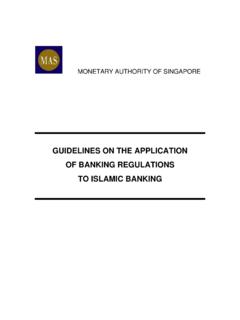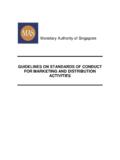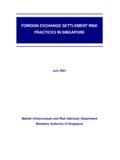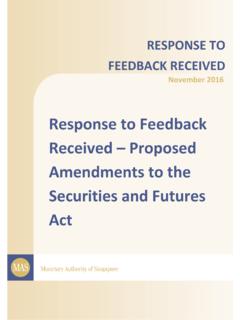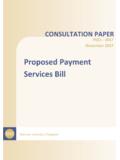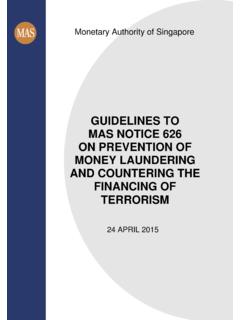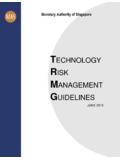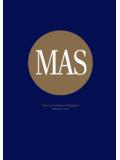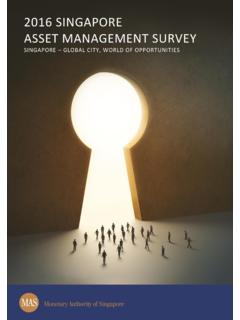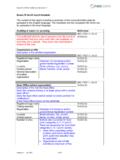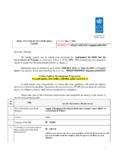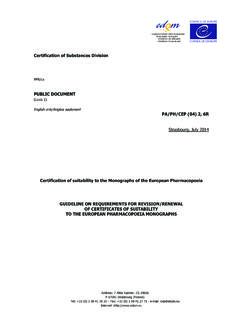Transcription of GUIDELINES ON OUTSOURCING - Monetary Authority of ...
1 Monetary Authority of Singapore GUIDELINES ON. OUTSOURCING . 27 JUL 2016. Table of Contents 1 INTRODUCTION .. 1. 2 APPLICATION OF GUIDELINES .. 1. 3 DEFINITIONS .. 3. 4 ENGAGEMENT WITH MAS ON OUTSOURCING .. 8. Observance of the GUIDELINES .. 8. Notification of Adverse Developments .. 9. 5 RISK MANAGEMENT 9. Overview .. 9. Responsibility of the Board and Senior Management .. 9. Evaluation of Risks .. 11. Assessment of Service 12. OUTSOURCING Agreement .. 14. Confidentiality and Security .. 16. Business Continuity Management .. 17. Monitoring and Control of OUTSOURCING 19. Audit and Inspection .. 21. OUTSOURCING Outside Singapore .. 23. OUTSOURCING Within a Group .. 25. OUTSOURCING of Internal Audit to External Auditors.
2 25. 6 CLOUD COMPUTING ..26. annex 1 ..28. annex 2 ..30. annex 3 ..32. GUIDELINES ON OUTSOURCING . 1 INTRODUCTION. While OUTSOURCING arrangements can bring cost and other benefits, it may increase the risk profile of an institution due to, for example, reputation, compliance and operational risks arising from failure of a service provider in providing the service, breaches in security, or the institution's inability to comply with legal and regulatory requirements. An institution can also be exposed to country risk when a service provider is located overseas and concentration risk when more than one function is outsourced to the same service provider. OUTSOURCING does not diminish the obligations of an institution, and those of its board and senior management to comply with relevant laws and regulations in Singapore, it is thus important that an institution adopts a sound and responsive risk management framework for its OUTSOURCING arrangements.
3 These Guidelines1 on OUTSOURCING ( GUIDELINES ) set out the Monetary Authority of Singapore's ( MAS ) expectations of an institution that has entered into any OUTSOURCING arrangement or is planning to outsource its business activities 2 to a service provider. An institution should conduct a self-assessment of all existing OUTSOURCING arrangements against these Guidelines3. 2 APPLICATION OF GUIDELINES . These GUIDELINES provide guidance on sound practices on risk management of OUTSOURCING arrangements. The GUIDELINES do not affect, and should not be regarded as a statement of the standard of care owed by institutions to their customers. The extent and degree to which an institution implements the GUIDELINES should be commensurate with the nature of risks in, and materiality of, the OUTSOURCING arrangement.
4 An institution should ensure that outsourced services (whether provided by a service provider or its sub-contractor). continue to be managed as if the services were still managed by the institution. In supervising an institution, MAS will review the implementation of these GUIDELINES by an institution to assess the quality of its board and senior management oversight and governance, internal controls and risk management. MAS is particularly interested in material OUTSOURCING arrangements. 1. Please refer to MAS' website ( ) for details of the classification of instruments issued by MAS. 2. Any reference in these GUIDELINES to business activities of an institution is to be construed as a reference to the business and operational functions and processes of the institution.
5 3. This includes institutions which are bound by OUTSOURCING arrangements as a result of an acquisition of the business of another institution. 1. GUIDELINES ON OUTSOURCING . annex 1 provides a non-exhaustive list of examples of OUTSOURCING arrangements to which these GUIDELINES are applicable, and arrangements that are not intended to be subject to these GUIDELINES . It should also not be misconstrued that arrangements not defined as OUTSOURCING need not be subject to adequate risk management and sound internal controls. annex 2 provides guidance to an institution in assessing whether an arrangement would be considered a material OUTSOURCING arrangement. annex 3 provides a template for an institution to maintain a register of its OUTSOURCING arrangements which is to be submitted to MAS, at least annually or upon request.
6 An institution incorporated in Singapore should also consider the impact of OUTSOURCING arrangements by its branches and any corporation under its control, including those located outside Singapore, on its consolidated operations. Institutions incorporated in Singapore should ensure that these GUIDELINES are observed by branches and corporations under their control by applying a group-wide OUTSOURCING risk management framework that complies with the GUIDELINES . The practices articulated in these GUIDELINES are not intended to be exhaustive or override any legislative provisions. They should be read in conjunction with the provisions of the relevant legislation, the subsidiary legislation made under the relevant legislation, as well as written directions, notices, codes and other GUIDELINES that MAS may issue from time to time pursuant to the relevant legislation and subsidiary legislation.
7 2. GUIDELINES ON OUTSOURCING . 3 DEFINITIONS. In these GUIDELINES on OUTSOURCING , unless the context otherwise requires: board or board of directors means . (a) in the case of an institution incorporated in Singapore, the board of directors; and (b) in the case of an institution incorporated or established outside Singapore, a management committee or body beyond local management charged with oversight and supervision responsibilities for the institution in Singapore;. bridge-institution means an institution, whether incorporated in Singapore or outside Singapore, to temporarily take over and maintain certain assets, liabilities and operations of a distressed financial institution, as part of a resolution Authority 's exercise of a resolution power.
8 Business relations . (a) In relation to an insurer, means (i) the issuance of a policy or reinsurance cover by the insurer to; or (ii) the provision of financial advice by the insurer to, a person (whether a natural person, legal person or legal arrangement);. (b) In relation to a bank, means (i) the opening or maintenance of an account by the bank in the name of;. or (ii) the provision of financial advice by the bank to, a person (whether a natural person, legal person or legal arrangement);. (c) In relation to a CMI, means (i) the opening or maintenance of an account by the CMI in the name of;. (ii) the provision of financial advice by the CMI to; or (iii) the provision of fund management services by the CMI to, a person (whether a natural person, legal person or legal arrangement).
9 (d) in relation to a financial adviser, means (i) the opening or maintenance of an account by the financial adviser in the name of; or 3. GUIDELINES ON OUTSOURCING . (ii) the provision of financial advice by the financial adviser to, a person (whether a natural person, legal person or legal arrangement);. (e) in relation to a credit card or charge card licensee licensed under section 57B of the Banking Act (Cap. 19), means the opening or maintenance of an account by the credit card or charge card licensee in the name of a person (whether a natural person, legal person or legal arrangement);. CMI means a person holding a capital markets services licence under the Securities and Futures Act (Cap.)
10 289) ( SFA ), a fund management company registered under paragraph 5(1)(i) of the Second Schedule to the Securities and Futures (Licensing and Conduct of Business) Regulations ( SF(LCB)R ) or a person exempted from the requirement to hold such a licence under paragraph 7(1)(b). of the Second Schedule to the SF(LCB)R;. customer means . (a) in relation to any trustee for a collective investment scheme authorised under section 286 of the SFA, that is approved under that Act, the managers and participants of the collective investment scheme;. (b) in relation to an approved exchange, recognised market operator, licensed trade repository, licensed foreign trade repository, approved clearing house, recognised clearing house, and central depository system under the SFA, a person who may participate in one or more of the services provided by such entities.
